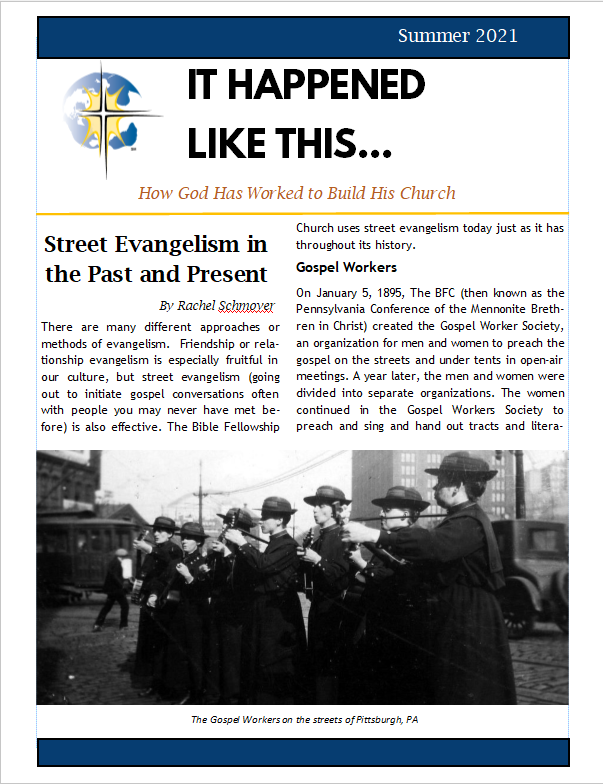There are many different approaches or methods of evangelism. Friendship or relationship evangelism is especially fruitful in our culture, but street evangelism (going out to initiate gospel conversations often with people you may never have met before) is also effective. The Bible Fellowship Church uses street evangelism today just as it has throughout its history.
Gospel Workers
On January 5, 1895, The BFC (then known as the Pennsylvania Conference of the Mennonite Brethren in Christ) created the Gospel Worker Society, an organization for men and women to preach the gospel on the streets and under tents in open-air meetings. A year later, the men and women were divided into separate organizations. The women continued in the Gospel Workers Society to preach and sing and hand out tracts and literature.
The women in the Gospel Worker Society boldly preached the gospel in saloons, bars, and on the street in slums. They wore uniforms patterned after the Salvation Army so there was no confusion as to why exactly they were there. Street preaching was effective partially because they were spending time in the cities where large crowds of people were.
In 1904, W. B. Musselman, the head of the Gospel Worker Society, reported, “We had more converts this year than any previous year… open air meetings were held in 40 of 50 different towns, besides where we have halls…” The next year he again reported, “They had more conversions during the summer than ever before.” Twenty years later, the Gospel Worker Society transitioned to focus on publishing tracts and Bible curriculum and moved out to Ohio. The publishing company is still there by the name Union Gospel Press.
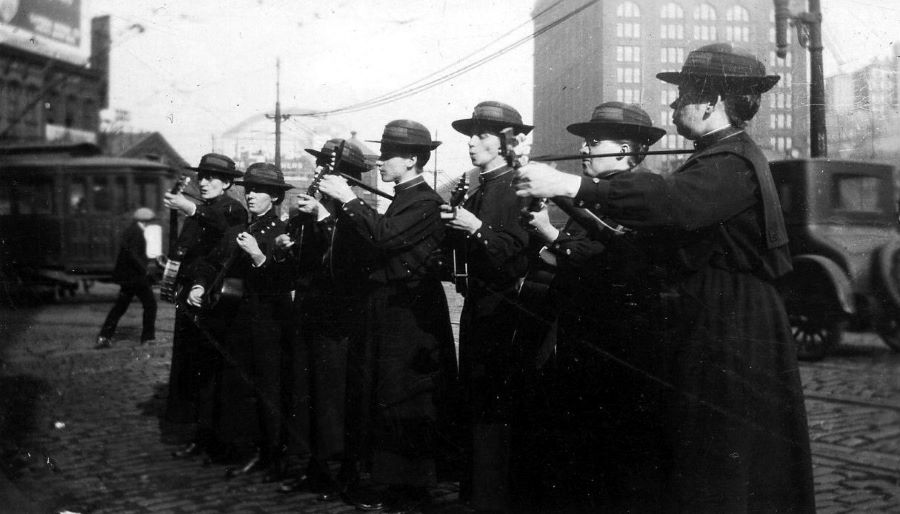
Gospel Heralds and Church Planting
The men formed the Gospel Herald Society to be trained into full-time ministry concentrating on open-air tent meetings. First the men were trained and educated for a short period of time. Then, if they were ready, they were assigned to hold public evangelistic services under a tent every night for a year or more. When there were enough people saved in the target area, they found a building and officially became a mission church. This is what happened in Chester, PA which eventually becomes our Wallingford church. You can read more and see more pictures about the founding of the Wallingford BFC here.
The tent meetings in Chester were quickly successful. They found a building within a few months after starting services. Even after they secured a building, they continued to aggressively evangelize out on the streets. They went door to door. They continued their tent meetings just a few blocks away from their church building. It wasn’t all preaching. The Gospel Heralds reached many children for Christ by playing baseball or football in the empty lot across the street from the mission. Like Wallingford, many of our older BFC churches started this way with intentional street evangelism.
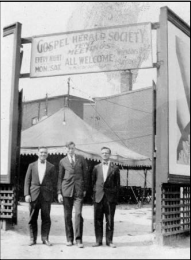
Local Church and Street Evangelism
Making evangelistic cold-calls did not just happen through these denomination-wide organized efforts. They also happened at the local church level. When the Easton church started the cradle roll in 1928 (Sunday School for the babies, a good way to get the whole family to church), the preacher’s wife walked through town, looking for homes with diapers drying on the clothes line. She would then knock on the door and invite the family to enroll their baby in the cradle roll.
In Easton, Bob Smock was the first baby enrolled in the cradle roll. Bob Smock grows up to become a pastor in the BFC for 63 years, the founding pastor of the Ephrata BFC church as well as serving in many other congregations along with his wife, Thelma.
Teens and Street Evangelism
As a teenager in the late 1940s, Dan G. Ziegler remembers doing some street preaching with the youth from Bethany BFC in Hatfield. They went to various farmers’ markets in the area. He said, “we gave out tracts and spoke our testimonies over a portable P.A. system. We would gather to roll ‘tract bombs’, covered with colored cellophane, to throw out of the bus when we went to a youth rally somewhere or to visit one of our home missions.”
Later still, Bethany BFC in Hatfield took their Sunday evening services out of doors each summer to Memorial Park in nearby Lansdale, where they presented a good musical program. The pastor, William A. Heffner, would preach clear evangelistic messages. Attendances at the park were excellent and souls were saved.
Later Dan Ziegler became the Director of Church Extension and continued to encourage the mission churches to take the Gospel to the people. In a 1976 report, he mentions how BFC churches are sharing the gospel out and about in their communities. Paradise BFC held summer Sunday evenings at a camper park. Mt. Carmel held evangelistic home Bible studies. Howell, NJ held outdoor meetings on the farm all summer. Bert Baker held unique door-to-door visitation evangelism ministry in Newark.
In the late 1980’s, Pastor Carl Martin recalls taking youth from Spring City, Harleysville, Graterford, and Royersford, on a meaningful trip to Boston, MA where they did about a week of street tract distribution and preaching in partnership with Open Air Campaigners. The youth gained experience in sharing the Gospel and in seeing strategic answers to prayer in the engagement of spiritual forces at work in opposition to the ministry.
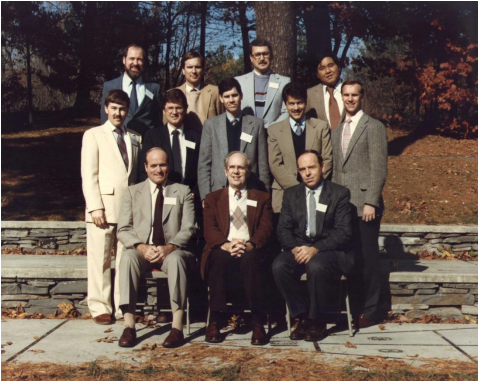
Street Evangelism in the BFC Today
BFC churches and pastors are still using this method to preach the gospel to those who need to hear about salvation in Jesus Christ.
Pastor John LoRusso said Cedar Crest Church has a street evangelism team go out two or three Saturdays a month. They have worked in downtown Allentown, mostly at the bus terminal and more recently at Cedar Beach Park.
Pastor Dan Williams from Trinity BFC in Blandon has done street evangelism at each church he’s been a part of. Years ago, as the outreach pastor in Wallingford, he and a group did street evangelism in Media and, occasionally, in Philadelphia. The college group went to Cape May to do literature distribution and evangelism on behalf of the church plant. In new Beginnings BFC in Woodbury Heights, the congregation canvased the 1,200 homes in Heights four or five times in seven years.
Pastor Dennis Spinney and the congregation at Valley BFC in New York use a variety of street preaching approaches. They have handed out Bibles and engaged people in conversation at the train station in Poughkeepsie. During the pandemic, they went to a busy road in town, at the stop light, with signs saying “Free Bibles”, and offered them to anyone who asked.
Missionary Frank Lenahan and Pastor Ralph Ritter have also engaged in walking through their cities and offered Bibles, prayer, and engaged in gospel conversation.
Your current church planters are engaged in street evangelism, too. Brad Boyer has a prayer walk team at Cape Community Church who has seen over ten people come to know the Lord this year! Other church planters are in the process of beginning this ministry, too.
Church Planter James Reff at Grace Community Church in Chestertown, MD engages with people through the local farmer’s market, initiating gospel conversations and following up with people who are interested.
All of our church planters have gone door to door in their area to meet people who need Jesus Christ.
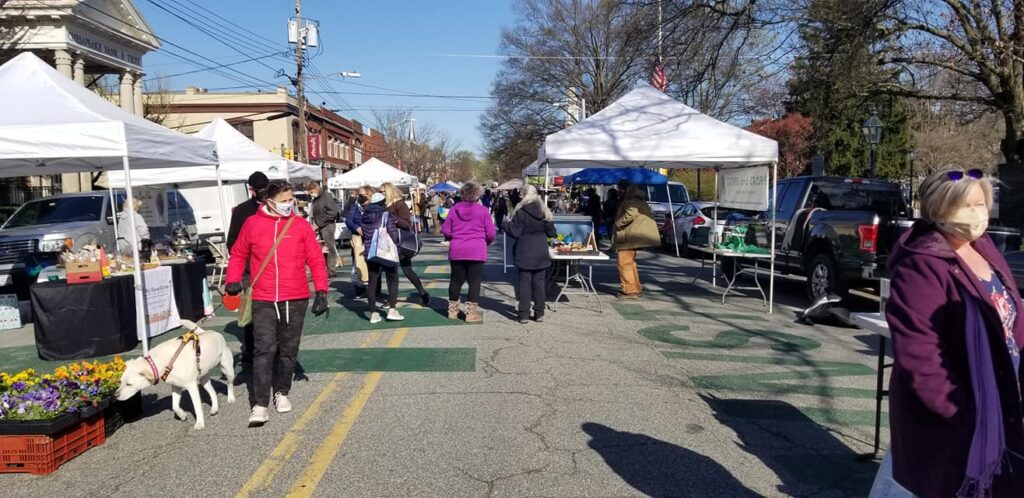
"Go Out Quickly!"
Throughout history and the present day, street evangelism has been an effective way to share the gospel of Jesus Christ with unbelievers. But the method is not the most important part of evangelism.
H.B. Musselman, one of the BFC’s most influential preachers and long-time Presiding Elder, said it well in 1922:
“How much time and energy is wasted in preaching the Gospel to those who do not need it, and to empty benches, while the multitudes for whom God intends it, hear it not. Buildings and halls are not the only places to preach God’s Word in. What multitudes of sinners never are reached through these channels! ‘The Son of Man is come to seek and to save that which is lost.’ If we would be in the succession of our Blessed Master, we also must go and seek them, and for this we must go where they are found.
‘The people will not come into our church’ is a common saying, and why should we largely expect them to do so? Our commission is to ‘GO’ and to ‘GO OUT’ and more, to ‘GO OUT QUICKLY!’“
